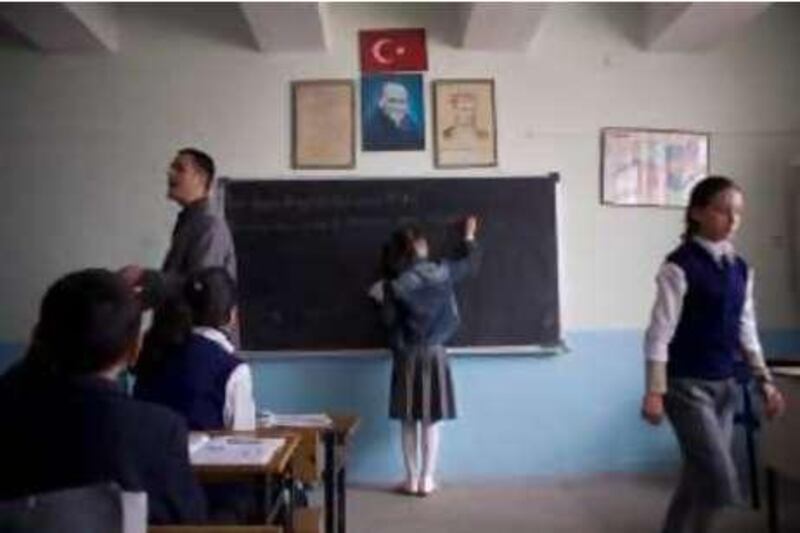ISTANBUL // A washing machine, given to her family in Turkey's poor south-eastern region by local officials, enabled Fatma Kana to go back to school after being kept home by her father. The initiative highlights Turkey's struggle to secure the education of 50,000 girls whose parents are unable or unwilling to send them to school. "Now Fatma is back in school," said Nesim Babahanoglu, governor of Hani district, where Fatma, 12, and her family live. "We bought the machine with the help of a charity."
Hani, in Turkey's Kurdish area in south-eastern Anatolia, is a poor and conservative region where many girls are not sent to school. Fatma's father had taken his only daughter among 11 children out of school to help with work at home because his wife is ill and confined to bed. "I had to do the washing," Fatma told a local newspaper. That changed when Mr Babahanoglu visited the Kana family to bring the washing machine. In a recent test at school, Fatma was among the top five out of 70 students, despite her five-month absence, Mr Babahanoglu said.
For the district governor, who was appointed only four months ago, Fatma's success story shows he is on the right track. He said he managed to secure school attendance for about 100 children since he started his work in Hani, 85 of them girls. "We all help, our teachers help, our imams help." He said there are about 200 children in the district whose parents have to be persuaded to send their sons and daughters to school. He put the overall figure of primary school children in his district at 10,000.
"It's going well. Slowly, slowly, excitement for this is building." Mr Babahanoglu and other local officials are indispensable in a nationwide campaign by Turkey's ministry of education, which is supported by Unicef. Between 2003 and 2007, the campaign, entitled "Come on, girls, off to school", has brought 239,112 girls who had been kept home into classrooms, said Omur Coban, an official at the education ministry in Ankara.
Although education of at least eight years is mandatory in Turkey, about 50,000 girls are growing up without going to school, Mr Coban said. The education campaign has the aim of lowering bringing that figure to zero by 2010. "It's a realistic aim," Mr Coban said. Growing public awareness, a modernised registration system that can be used to track down families with school-age children and more effective co-operation between central and local officials as well as NGOs have all contributed to the campaign's success, he said.
There are many reasons why Turkish families refuse to send their girls to school, Mr Coban and other experts say. Poverty, as in the case of Fatma Kana's family, plays a big role, as do traditional values. About 13 million of Turkey's 70m people are officially considered poor, with a monthly family income of less than 549 New Turkish lira (Dh1,600) a month, according to the latest available figures from Turkey's statistics office.
Poverty is especially acute in Turkey's eastern and south-eastern regions like Fatma's home district. Poor families often send their sons to school, but not their daughters, because girls are often married off at a young age and their education is seen as a waste of precious resources. Other parents think their daughters could come into indecent contact with boys at school. In Turkish villages, where families feel their honour is damaged if their daughters are rumoured to be less than modest, schools can be seen as dangerous mixing grounds. "Sometimes it's enough to put a dividing wall in the school toilet" to fix the problem, Mr Coban said.
Even though creative solutions like Mr Babahanoglu's washing machine sometimes do the trick, the going is not always easy for Turkey's education activists. In one case in the southern city of Adana that attracted nationwide attention, education officials last year visited the family of Osman Kaplan to ask why his daughter Meryem was not at school, despite being 16 years old. Meryem told the inspectors she had never entered a classroom in her life and wanted nothing more than an education to become a doctor. She had taught herself to read and write at home.
Meryem's father at first refused to send her to school and told local media he was going to marry her off to a relative instead. He changed his mind only after local journalists and activists revisited him in a last-ditch effort and pointed out that if his daughter became a doctor she could look after him in his old age. @Email:tseibert@thenational.ae






